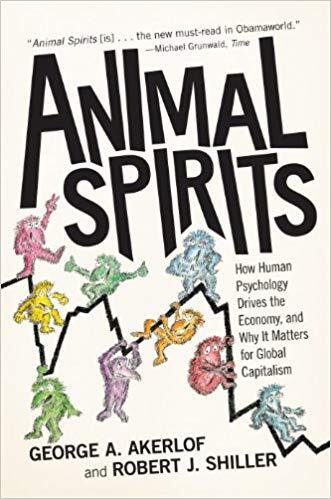Animal Spirits
Review Animal Spirits: How Human Psychology Drives the Economy, and Why It Matters for Global Capitalism
by GEORGE A. AKERLOF, ROBERT J. SHILLER
Description
Economists Robert Shiller and George Akerlof discuss the psychological and economic factors that caused the recent global financial crisis and the economic state after it. The two authors put forward innovative ideas about the government’s role in active policymaking and other visions that aim to revolutionize economics. For this to be done, the authors suggest reviving the ‘animal spirits’ or the term John Maynard Keynes coined to describe the gloomy atmosphere that led to the Great Depression.
Highly recommended for graduate-level students of economics, this book is a detailed overview of Keynes’ ideas, as well as an introduction to behavioral economics. The authors outline the basic ideas and how they can be integrated into the current economic state as a form of recovery.
The authors primarily focus on the psychological factors that led to the 2008 global financial crisis, accompanied by a course on macroeconomics. The authors present radical ideas about revolutionizing economics, especially by taking in the role of society in it. It provides great insight into the function of human behavior in financial markets.
About the Author
GEORGE A. AKERLOF is a renowned Professor of Economics at the University of California, Berkeley. He was awarded the Nobel Prize in Economics in 2001.
ROBERT J. SHILLER is a best-selling author of a few books on finance. He is the Arthur M. Okun Professor of Economics at Yale University.
Table of Contents
Preface to the Paperback Edition
Preface
Acknowledgments
INTRODUCTION
PART ONE: ANIMAL SPIRITS
One Confidence and Its Multipliers
Two Fairness
Three Corruption and Bad Faith
Four Money Illusion
Five Stories
PART TWO: EIGHT QUESTIONS AND THEIR ANSWERS
Six Why Do Economies Fall into Depression
Seven Why Do Central Bankers Have Power over the Economy (Insofar as They Do)?
Postscript to Chapter Seven The Current Financial Crisis: What Is to Be Done?
Eight Why Are There People Who Cannot Find a Job?
Nine Why Is There a Trade-off between Inflation and Unemployment in the Long Run?
Ten Why Is Saving for the Future So Arbitrary?
Eleven Why Are Financial Prices and Corporate Investments So Volatile?
Twelve Why Do Real Estate Markets Go through Cycles?
Thirteen Why Is There Special Poverty among Minorities?
Fourteen Conclusion
Notes
References
Index
